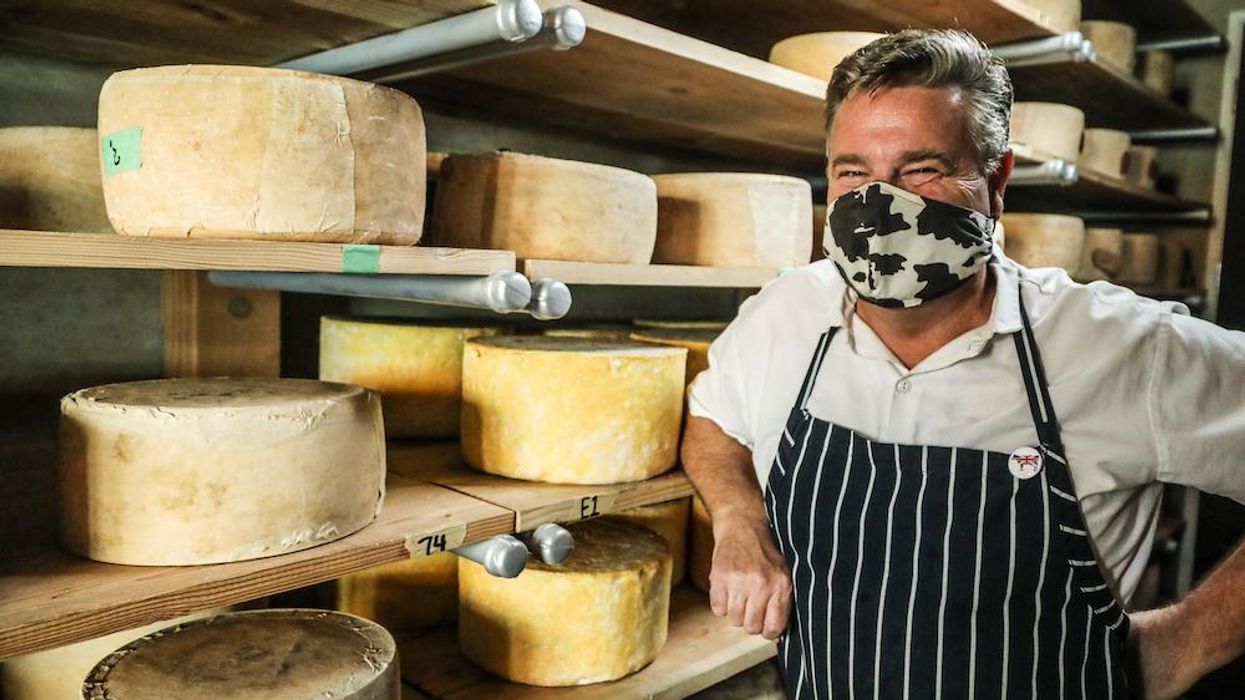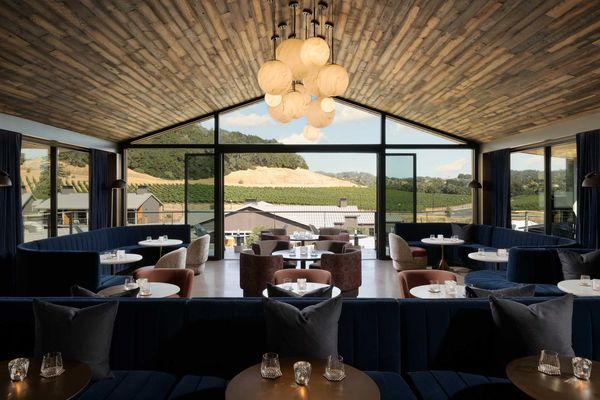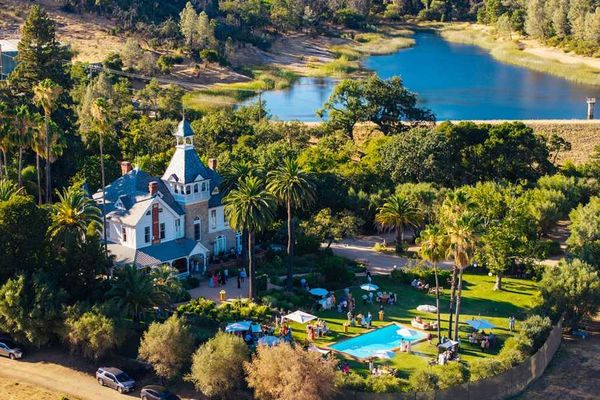Much like wine, terroir impacts the flavor and style of cheese. And Northern California terroir is ripe for cheese production.
“The mild Mediterranean climate of Marin and Sonoma counties and steady moderate temperatures result in consistent milk production,” says Valerie Miller, director of the California Artisan Cheese Guild. “Raising dairy cows here allows milk production to continue throughout the year.”
With that consitent milk production and the wide range of microclimates found within the Bay Area, dairies can produce a variety of European-style cheeses. From English cheddar to Italian mozzarella, these five cheesemakers in Marin and Sonoma churning out tastes of the Old World.
Nicasio Valley Cheese Company
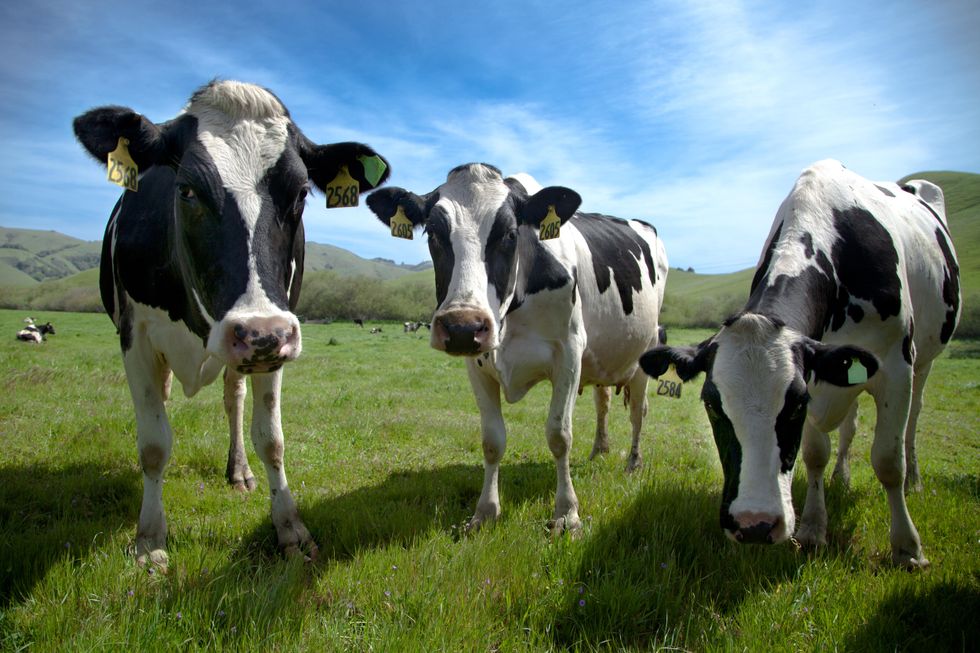
Cows from the Nicasio herd
(Courtesy of Nicasio Valley Cheese Company)
At Nicasio Valley Cheese Company, California’s only producer of organic farmstead cow’s milk cheese, the cows graze on bucolic Marin pastureland for around 120 days per year. The cheese's style, though, hails from farther afield: The patriarch of the family-run business, Fredolino LaFranchi, emigrated from Maggia, Switzerland near the Italian border in the early 20th century.
The family has been ranching their land in Nicasio since 1919, and his grandchildren began making traditional Swiss-Italian and Italian alpine-style cheese in 2010. Their teacher was Maurizio Lorenzetti, a master cheesemaker from their Fredolino's home village. He later claimed that the cheese they’re making in California is better than the cheese made in Italy because of the freshness of the milk. The better the milk, the better the cheese.
Among Nicasio Valley's offerings are soft ripening and washed rind cheeses. Their Foggy Morning fromage blanc-style (great for pairing with “anything, anytime, anywhere”) and the flavorful Nicasio Reserve (an Italian alpine classic) are both award-winners. The Nicasio Square is reminiscent of a pungent Taleggio, while the Lucas Valley, a newer, mellow-washed rind cheese, has a bit of funk to it.
// Nicasio Valley Cheese Company is open 10am to 5pm daily and is available at stores Bay Area–wide; 5300 Nicasio Valley Rd. (Nicasio), nicasiocheese.com
Marin French Cheese Company
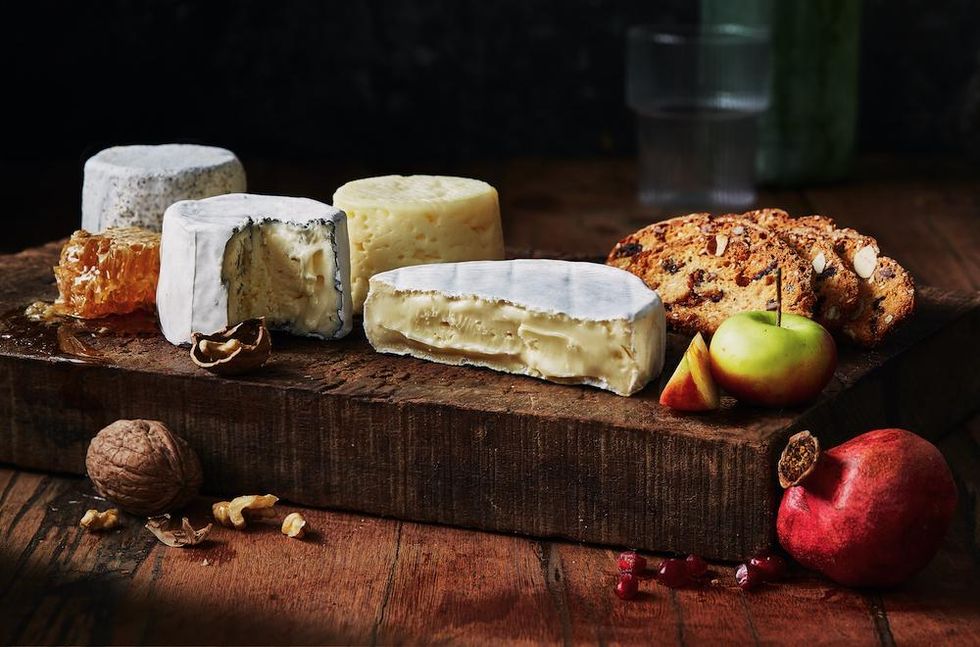
A cheese board from Marin French Cheese Company
(Courtesy of Marin French Cheese Company)
Marin French Cheese Company has been making cheese in Petaluma since mid-19th century. Founder Jefferson Thompson bought a 700-acre ranch in the 1860s after making the wagon train journey west from Illinois.
The company's flagship cheese, the Petite Breakfast, was his answer to the egg shortage during the Gold Rush era. Like a French brie but unripened, the mild, slightly tangy cheese proved to be a perfect breakfast protein for miners. The business was run by the Thompsons for two generations. Today it's owned by a family of fourth-generation French cheesemakers.
The triple crème brie and camembert is rooted in French tradition, but the cheesemakers aren't afraid to innovate. In 2021, Marin French Cheese debuted Golden Gate, a pungent, washed-rind brie with a rind the color of, well, you can guess. And starting October 14th, they'll release Petite Boo, a limited-edition triple crème brie with a thin layer of vegetable ash and an orange rind, for Halloween.
Hot tip: Along with cheese, the creamery shop has plenty of goodies to go. It's all best enjoyed as a picnic by the onsite pond.
// Marin French Cheese is open daily except major holidays from 10am to 6pm; 7510 Pt. Reyes-Petaluma Rd. (Petaluma), marinfrenchcheese.com.
Wm. Cofield Cheesemakers
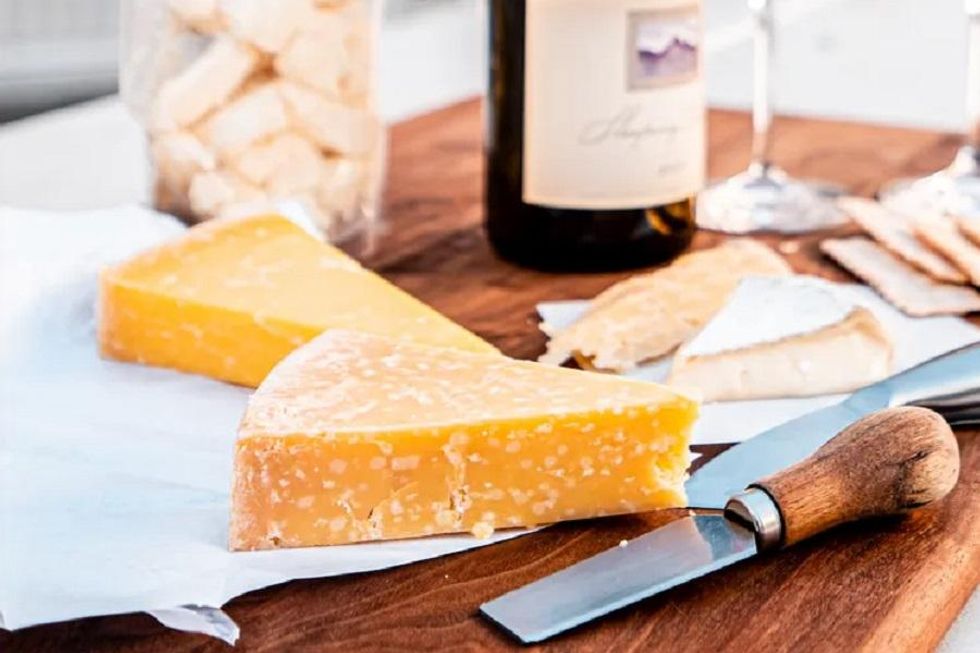
24-month aged cheddar at Wm. Cofield Cheesemakers
(Courtesy of Wm. Cofield Cheesemakers)
Since training at Stichelton Dairy and Westcombe Dairy in England, cheesemaker Keith Adams has been bringing a taste of Britain to Sebastopol's Barlow. His company, Wm. Cofield Cheesemakers, which opened in 2016, is a relative newcomer to the Northern California cheese game, but the creamery and cheese shop is Adams' dream. "It's everything I wanted it to be," he says.
Adams' featured cheeses include his Stilton-style Bodega Blue. It is a humbling style to make, the cheesemaker confesses: a four-month process of ladling, milling, salting the curd, turning it, and buttering it up. About two months in, he pierces the rind with stainless steel to let oxygen get the flavors of the cheese going. It's "pretty boring and kind of bitter before the enzymes and microbes turn it tasty," Adams explains, but he’s got the process down. The result is a rich mix of sweetness and saltiness.
You'll also find clothbound cheddars, aged 12 or 24 months for a sharper flavor. From the Barlow store, you can see into the creamery and the aging rooms where the wheels of cheese are stacked on Douglas Fir planks. And along with the signature English style cheeses, Adams stocks some Minnesota favorites in honor of the state where he got his start in cheesemaking in 2009.
// Wm. Cofield Cheesemakers is open Friday and Saturday from 11am to 6pm and Sunday from 11am to 4pm; 6780 McKinley St. #110 (Sebastopol), wmcofieldcheese.com
Joe Matos Cheese & Farmstead Company
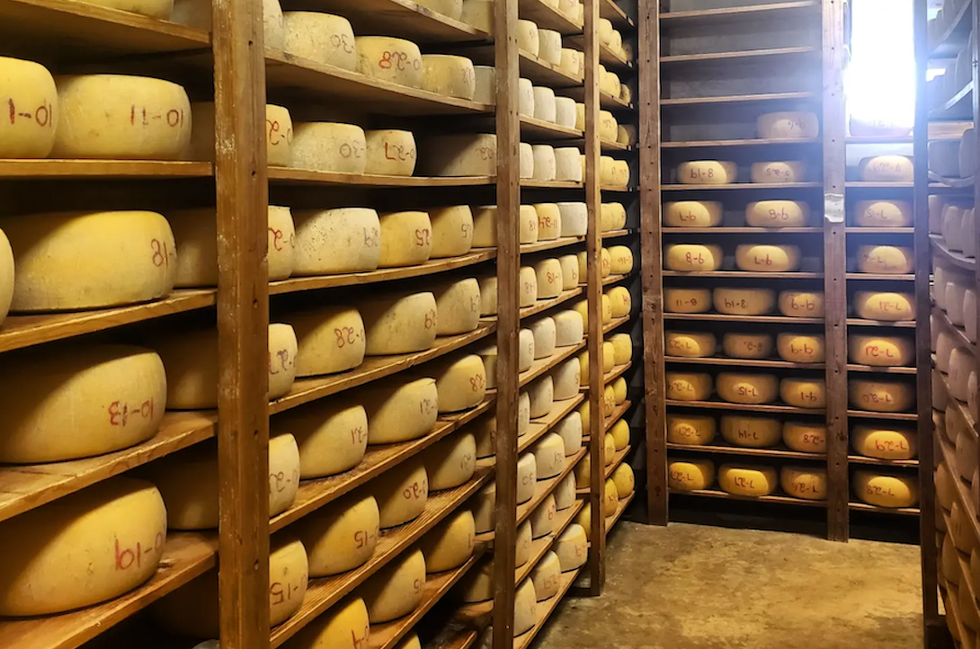
Cheese aging at Joe Matos Cheese & Farmstead Company
(Courtesy of Joe Matos Cheese & Farmstead Company)
Fifth-generation cheesemaker Joe Matos emigrated from São Jorge in the Azores Islands of Portugal back in the 1960s, bringing with him a particularly local style of cheese that he still makes today. Although his St. Jorge cheese is Americanized in name, and the Northern California milk has its own inherent flavor thanks to the local terroir, it's still about as authentic as it gets.
Matos’ granddaughter, Tiffany Rickert, explained the process. The family grows its own hay and grasses to feed their 20 or so milking cows. The cheese that's made in summer—a creamy, silky variety aged for three months—really highlights the bright freshness of the season's green grass. (Matos ages cheeses from three to 16 months, making their products more accessible to stinky cheese neophytes.) Rickert is also a fan of their 16-month aged cheese, which she calls “super decadent and indulgent with a butterscotch taste underneath.”
// Joe Matos Cheese & Farmstead is open from 9am to 5pm daily; 3669 Llano Rd. (Santa Rosa), joematoscheeseco.com.
Ramini Mozzarella
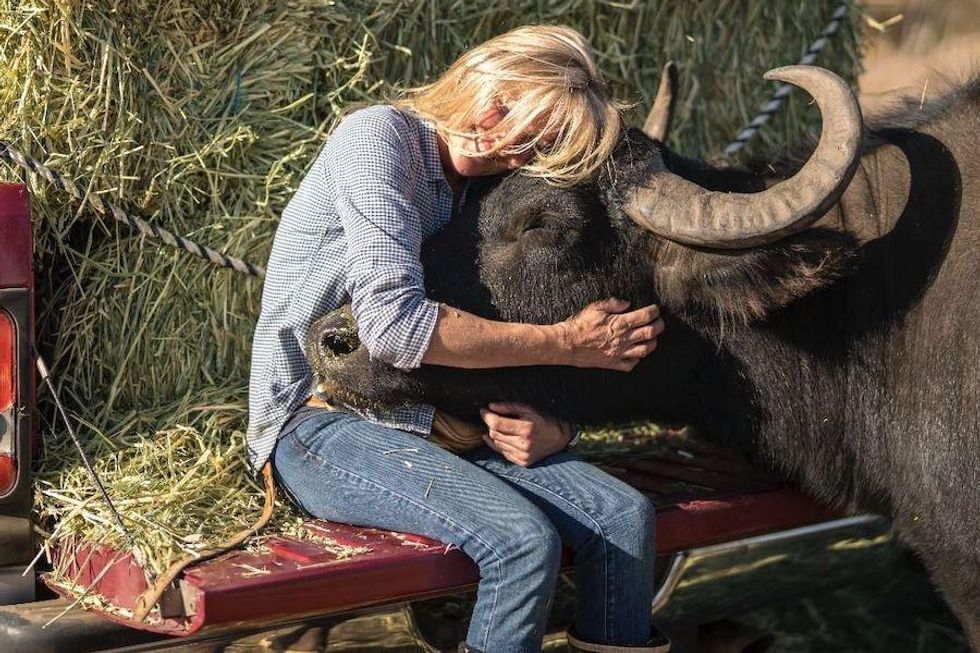
Ramini Mozzarella proprietor, Audrey Hitchcock
(Courtesy of @raminimozzarella)
If you want real mozzarella di bufala the way it’s made in Italy, you have to use Italian water buffalos: the milk has more butter fat than cow’s milk does, which makes their cheese particularly creamy. So that's how they do it at Ramini Mozzarella, started by Audrey Hitchcock and her late husband Craig Ramini in 2009.
The couple, who met in Boston, didn't have a background in cheese, but they founded the business based on a passion for animals and food, with a quest to keep it unique. They took a look at the current cheese scene in the area, and after a suggestion from her brother to make Italian mozzarella and a lot of research, they decided to give it a go.
They started out with five water buffalo, and now have a herd of nearly 80. For Hitchcock, it’s all about understanding and loving her animals. "If you give them love and affection," she says "they will give it back." The buffalo are milked once a day, a limited milking schedule compared to most dairies that milk morning and evening, to allow the calves to spend much of their day with their mothers.
She offers tours on Saturdays where visitors can meet the water buffalos and try (and buy) the creamy cheese. It's also sold at a number of farmer's markets around the region. This October, she’ll be hosting special events including a screening of a documentary about the business, Ramini. Although their lease is coming to an end after Halloween, Hitchock is on the lookout for their next creamery somewhere nearby.
// Ramini Mozzarella will be offering tours and tastings on Saturdays though October 2022; 175 Gericke Rd. (Tomales), raminimozzarella.com.



